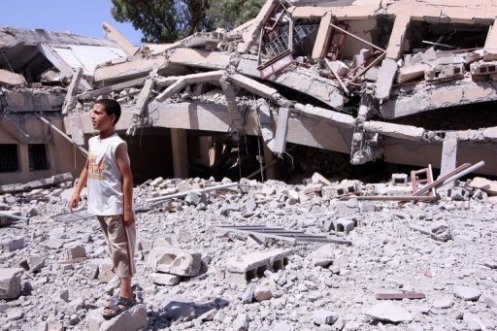Libya blasts NATO village massacre. Rebels in crisis.

A boy stands amid the rubble outside a destroyed school in the coastal town of Zliten, east of Tripoli where US/NATO warplanes bombed a village slaughtering 85 civilians including 33 children, 32 women and 20 men.
Libyan authorities on Tuesday accused NATO of a "massacre" of 85 villagers in air strikes in support of rebels, whose political leadership was in crisis with the sacking of its top officials.
The village of Majer, 10 kilometres (six miles) south of Zliten in western Libya, was attacked late on Monday to try to help rebel fighters enter the government-held city from the south, government spokesman Mussa Ibrahim said.
"After the first three bombs dropped at around 11:00 pm (2100 GMT) on Monday, many residents of the area ran to the bombed houses to try to save their loved ones. Three more bombs struck," he told reporters on an organised visit.
Thirty-three children, 32 women and 20 men from 12 families were killed in the "massacre," Mussa said.
Rebels fighting around Zliten, 120 kilometres to the east of Tripoli, said on Monday they were running low on ammunition as they struggled to hold off an assault by loyalist forces.
Abdul Wahab Melitan, a rebel spokesman in the nearby port city of Misrata, said forces loyal to Libyan leader Moamer Kadhafi had launched an assault on their positions around Zliten on Sunday.
The rebels, advancing from Misrata, a week ago punched into the centre of Zliten, sparking fierce clashes. But they later pulled back to the edge of the city of 200,000 inhabitants.
NATO in Brussels said alliance warplanes hit eight targets in the Zliten area on Sunday -- four command and control nodes, one military facility, a weapons dump, an anti-tank weapon and a multiple rocket launcher.
It was yet to give an update on Monday's air raids.
Early on Tuesday, explosions in the Fernej district of southwest Tripoli struck at between 1:00 am (2300 GMT) and 2:00 am, sending flames shooting into the night sky, an AFP correspondent said.
They were followed by a series of smaller blasts, suggesting an arms depot had been hit. Two other explosions followed at around 6:00 am, he said.
In the rebel capital of Benghazi in eastern Libya, Mustafa Abdel Jalil, chairman of the National Transitional Council (NTC), sacked the entire executive office of his government late on Monday.
NTC officials said he dismissed several top ministers -- including those responsible for finance, defence and information -- while calling for root and branch reform.
"Mr Mustafa Abdel Jalil has disbanded the executive office," spokesman Shamsiddin Abdulmolah told AFP, adding that prime minister Mahmud Jibril would be tasked with creating a reformed body.
It was the latest dramatic phase in the turmoil sparked by the assassination of rebel military commander General Abdel Fatah Yunis -- amid his return to Benghazi under arrest in late July.
The NTC has come under fire for its role in events leading up to Yunis's death, as well as its handling of the aftermath.
Although details are sketchy and still under investigation, it is known that an arrest warrant was signed by senior NTC executive member Ali Essawy, raising allegations that the NTC unknowingly helped facilitate his murder.
Essawy was one of the most visible members of the rebel government -- the interlocutor for visiting foreign dignitaries.
The council has faced angry and sometimes violent protests from Yunis's tribe, as well as demands for reform from groups that were at the forefront of the uprising against Libyan leader Moamer Kadhafi that erupted in mid-February.
Jalil has vowed that an internal investigation into the NTC's management of the crisis would not flinch from apportioning blame. "No one is above the law, starting from the top of the NTC," he said.
Since the general's death, tribal tensions have come to the surface in a country where clans for decades have formed the basis for solving disputes in the absence of functioning judicial institutions.
Insiders have reported frequent clashes between the NTC, whose members were largely Libyan-based lawyers and former members of Kadhafi's regime, and the executive branch, the majority of whom were exiles.
Source: AFP